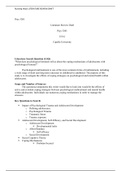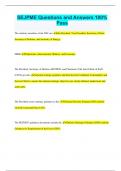Running Head: LITERATURE REVIEW DRAFT
Psyc 5201
Literature Review Draft
Psyc 5201
U5A1
Capella University
Literature Search Question (LSQ)
“What does psychological literature tell us about the coping mechanisms of adolescents with psychological trauma?”
Psychological maltreatment is one of the most common forms of maltreatment, including a wide range of short and long term outcomes in childhood to adulthood. The purpose of this study is to investigate the effects of coping strategies on psychological and mental health within adolescents. Scope and Number of Sources
The questions/components this writer would like to look into would be the effects of active and avoidant coping strategies between psychological maltreatment and mental health within adolescents. Individuals use numerous coping mechanisms in order to manage the stressors. Key Questions to Search:
Impact of Psychological Trauma and Adolescent Development
oDefining adolescence
oPsychological Trauma
oTraumatic Stress
oTrauma exposure Adolescent Development, Self-Efficacy, and Social Development
oAdolescent Development
Developmental tasks
oAlbert Bandura
Self-efficacy
oSocial Development
Social Cognitive Theory
Coping Mechanisms Problem-focused LITERATURE REVIEW DRAFT
Emotional-focused
Avoidant Abstract
The purpose of this review is to explore coping mechanisms of adolescents who have experienced psychological abuse, and to investigate the effects of active and avoidant coping strategies between psychological maltreatment and mental health within adolescents. By investigating the effects of coping strategies on the association between psychological maltreatment and mental health problems, outcomes indicate that active coping mechanisms and avoidant coping mechanisms may have a full mediational effect on the relationship between psychological maltreatment and mental health. Self-efficacy, responses to stress, coping mechanisms, and persistence were measured in order to measure resilience, maladaptive behaviors, and adversity. Review of Literature
Impact of Psychological Trauma and Adolescent Development
Adolescence is a complex time to include changes within social relationships and responsibilities, and is a crucial time in terms of establishing important intimate relationships, which can shape personality, identity and lifestyles. Trauma can have a negative impact on the stages of development during adolescence, to include emotional development, emotional control,
and being able to positively express feelings. If trauma occurs within a certain stage in development, there is danger that new skills could be in distress (Moradi et al., 1999). Awareness
is arising pertaining to trauma and the negative affects it can have on adolescent development and functioning (Chanmugam & Teasley, 2014). LITERATURE REVIEW DRAFT
Within the community, research reports that nearly two thirds of adolescents have reported experiencing a traumatic event by the age of 16. However, estimates of trauma rates and
psychological trauma within adolescents vary depending on the type, measurement, and other factors. Traumatic stress is the emotional/physical response to events of an individual that threatens the life, or physical/psychological integrity of a person, producing an overwhelming sense of helplessness. There are several types of trauma (acute, chronic, and complex) (Kilpatrick, 2005). According to the National Child Abuse and Neglect Data System, trauma has been shown to have a negative affect on neurobiological systems responsible for the cognitive regulation and development of emotions/behavior. Changes affecting brain/hormonal development and can lead to risks of depression and behavioral concerns, including: aggression, isolation, alcohol and drug use, and other deficits including future delays (De Bellis, 2005). One of the most common forms of trauma is psychological maltreatment, however it is the most commonly ignored. Psychological trauma includes harmful experiences that could potentially have an influence within the development of coping mechanisms. Psychological maltreatment is reported to have a predictive role for mental health concerns compared to maltreatment experiences (Brown et al., 2016; Gross & Keller, 1992). Being able to understand the mechanisms is an important way to provide prevention and intervention services to help adolescents cope. Psychological trauma consists of three major types: problem-focused (task oriented, and directed to manage/alter a stressful event), emotional-focused (person-oriented, and
attempt to manage/regulate emotions and reduce stress), and avoidant coping mechanisms (refer to activities and cognitive changes in order to avoid stress, including person and task-oriented strategies) (Lazarus & Folkman, 1984). As stated by Danese and Baldwin (2017), trauma has both short and long-term associations with an increased risk of physical and mental health





